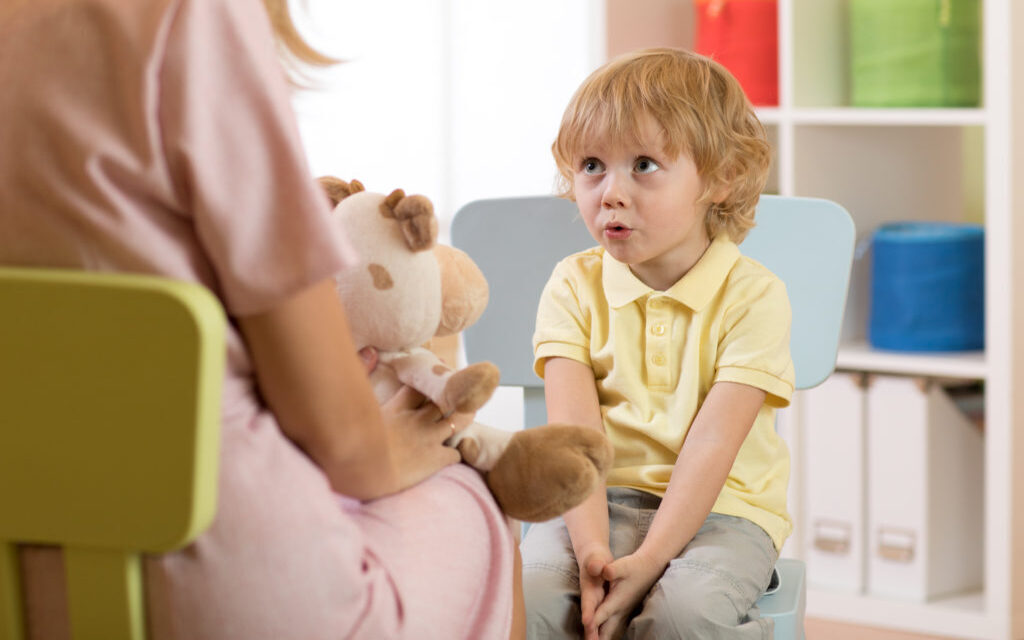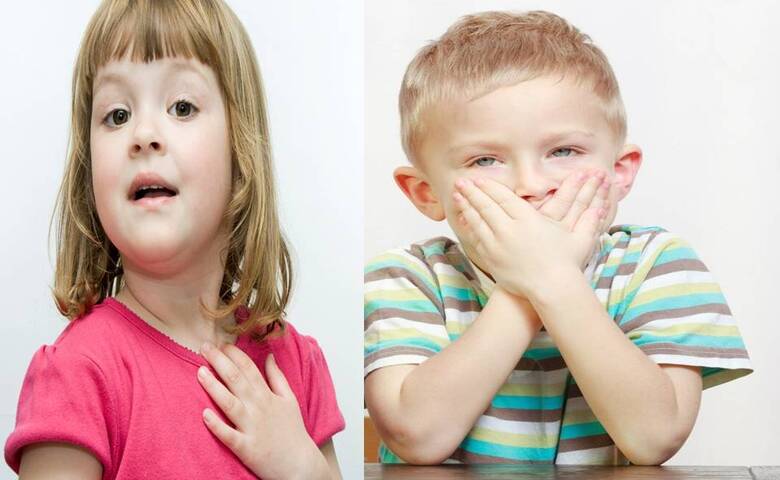Children are able to acquire a language from birth, but they must first learn the language or languages that their environment and family speak. It takes time to learn a language, and kids develop their language and speech at different rates. Children that are typically developing may struggle while learning with certain sounds, words, and phrases face speech or language disorders.
However, most kids start using language naturally around the age of five. Some kids require assistance because there are speech or language disorders in children. They could not develop language milestones at the same rate as other kids, which could indicate a speech or language delay.
Speech or language disorders in children can coexist with other learning disabilities that impact writing and reading. In frustration at their inability to communicate effectively with others, children with language difficulties may act out, present themselves as helpless, or withdraw. Disorders of language or speech can coexist with mental or behavioural conditions like anxiety or attention-deficit/hyperactivity disorder (ADHD). Children with developmental problems, such as autism spectrum disorder, may also struggle verbally.
One of the most prevalent neurodevelopmental diseases in children is ADHD. It frequently persists into maturity and is typically first diagnosed in childhood. Children with ADHD may struggle to focus, manage impulsive behaviours (doing without considering the consequences), or be extremely active.
Developmental impairment known as autism spectrum disorder (ASD) is brought on by variations in the brain. People with ASD may behave, interact, communicate, and learn differently than most other people. Frequently, their appearance does not separate them from others.
People with ASD might have a wide range of abilities. For instance, while some ASD sufferers are nonverbal, others may have superior conversational skills. Some persons with ASD require a lot of assistance in their daily life, while others may function independently and work. ASD typically shows before the age of three and can last the rest of a person’s life, though symptoms occasionally become better with age.
Table of Contents
Speech Disorders in Children

A speech disorder is a condition where a person struggles to produce or shape the spoken sounds necessary for interpersonal communication. As a result, it could be challenging to understand the child’s speech.
In children, speech abnormalities are distinct from language disorders. Someone with language difficulties has trouble with:
- reaching others with their purpose or message
- recognising the message others are trying to convey
Causes
One of the primary ways we interact with those around us is through speech. Along with other indicators of typical growth and development, it naturally develops. Children in the preschool years frequently have speech and language disorders.
Treatment

Milder varieties of speech impairments may be outgrown by children. The severity of the speech disorder and its underlying cause will determine the sort of treatment needed.
With more severe symptoms or any persistent speech issues, speech therapy may be helpful.
Your kid may learn how to make specific sounds with their tongue throughout therapy.
In the event that a kid develops a speech problems, parents should:
- Avoid becoming overly concerned about the issue because this can make the kid more self-conscious, which can worsen the problem.
- When feasible, stay away from uncomfortable social settings.
- Make eye contact, exhibit love and acceptance, and listen calmly to the child.
- Don’t complete their sentences for them.
- Allocate time for conversation.
Issues that could arise
Due to communication difficulties, speech impairments can make it difficult to communicate socially.
Prevention
Speech difficulties are at risk because of hearing loss. Infants at risk ought to be referred to an audiologist for a hearing evaluation. Then, if required, hearing and speech therapy might be initiated.
Disfluency is typical among young toddlers who are learning to speak, but for the most part, it goes away on its own. A stuttering pattern could emerge if the disfluency receives too much focus.
Language Disorders in Children

Children with language disorders have issues with one of the following:
- reaching others with their purpose or message
- recognising the message others are trying to convey
The speech of children with language problems can be understood and they can make sounds.
Causes
For the majority of babies and kids, language development starts at birth and happens organically. A youngster has to be able to hear, see, understand, and remember in order to acquire language. Children also need to be physically able to speak.
One in twenty kids may be showing signs of a linguistic impairment. It is referred to as a developmental language disorder when there is no recognised aetiology.
Receptive language difficulties typically appear before the age of four. One reason for some mixed language difficulties is a brain damage. Occasionally, developmental abnormalities are misdiagnosed as these conditions.
Children with other developmental issues, autism spectrum disorder, hearing impairments, and learning challenges may also experience language disorders. Aphasia is a linguistic impairment that can result from damage to the central nervous system.
Rarely is a lack of intelligence the root cause of a language issue.
Delay in language is different from language disorders. The kid who has delayed language learns speech and language later than other children. Speech and language do not develop normally in people with language problems. The child might possess some language abilities but not others. Alternately, these skills may emerge in a slightly different manner.
Treatment

The best method for addressing this kind of language problem is speech and language therapy.
It is also advised to seek counselling, such as talk therapy, due to the risk of comorbid emotional or behavioural issues.
Issues that could arise
Understanding and speaking English incorrectly might interfere with social engagement and an adult’s capacity for freedom.
There might be a reading issue.
Language impairments may be made more difficult by mental or behavioural issues such as depression, anxiety, or others.
Frequently Asked Questions
1. What Causes Delays in Speech or Language?
Speech and language disorders are different yet frequently coexist. As an illustration, a youngster with a language delay might be able to utter individual words well but only combine two words.
When expressing thoughts, a kid with a speech delay could use words and phrases that are difficult to grasp.
2. Can abnormalities of speech be treated?
Many speech impairments cannot be fixed, but many children and adults can improve their speech or learn to use different forms of communication by undergoing speech and language therapy from a qualified speech pathologist.
3. How Do Language and Speech Differ?
Speech, which also includes articulation, is the spoken representation of language (the way we form sounds and words).
Information is communicated and received through language. Understanding and being understood through verbal, nonverbal, and textual communication.
4. Why can’t my four-year-old speak clearly?
Many children who have speech impairments also have oral-motor issues. These occur when there is an issue with the parts of the brain that control speech. The coordination of the lips, tongue, and jaw to produce speech sounds is hampered as a result. These children could potentially be experiencing difficulties with feeding or other oral-motor issues.
5. What Indicates a Language or Speech Delay?
A doctor should be consulted as soon as possible for a newborn who doesn’t vocalise or respond to sounds. However, it’s frequently challenging for parents to determine whether their child is simply taking a little longer than usual to complete a speech or language milestone or whether something is wrong.
6. When is speech regarded to be delayed?
If your child is unable to do any of the following, they may be experiencing a speech delay: By the age of 12 to 15 months, utter simple words (such “mama” or “dada”) either clearly or unclearly. comprehend simple words (such “no” or “stop”) by the age of 18 months. By age 3, begin using brief sentences when speaking.
7. Is a three-year-old not speaking typical?
A 3-year-old who is vocally and nonverbally expressive but has difficulty speaking may be experiencing a speech delay. Someone who has difficulty speaking in complete sentences may be experiencing language delays. Some speech and language problems are linked to brain activity and could be a sign of a learning disability.
8. When should I start worrying about my child’s speech development?
Here are several warning signs. In the event that your child:
by the age of a year: isn’t making hand movements like pointing or waving good-bye
by 18 months: prefers to communicate through gestures rather than vocalisations
by 18 months: struggles to mimic sounds
has difficulty comprehending simple vocal commands
By the age of two, a child can only mimic speech or motions; they are unable to spontaneously utter words or phrases. By the age of two, a child merely repeats a few sounds or syllables and cannot use oral language to express anything more than their immediate demands. cannot follow simple instructions by the age of two has a peculiar vocal tone (such as raspy or nasal sounding)
If your child’s speech is more difficult to understand than is typical for their age, you should also call the doctor:
At two years old, parents and other frequent caretakers should be able to understand roughly 50% of a child’s speech, and at three years old, 75%.
A child should be mostly understandable by the time they turn 4 years old, even to those who don’t know them.
9. Can speech lag be corrected?
Simple speech hiccups can occasionally occur. They might get better by themselves or with a little extra assistance from family. Spend lots of time playing, reading to, and conversing with your infant or toddler. Encourage your child to “speak” to you using gestures or sounds.
10. What Leads to Delays in Speech or Language?
A delay in speaking could result from: An oral disability, such as issues with the tongue or palate (the roof of the mouth)
An inadequately long frenulum, which can restrict tongue movement
Many children who have speech impairments also have oral-motor issues. These occur when there is an issue with the parts of the brain that control speech. The coordination of the lips, tongue, and jaw to produce speech sounds is disrupted as a result. These children could potentially be experiencing difficulties with feeding or other oral-motor issues.
Speaking might be hampered by hearing issues. Thus, whenever there is a speech concern with a youngster, an audiologist should examine their hearing. Children with hearing loss may have difficulty speaking, understanding, imitating, and using language.
Hearing loss can result from ear infections, particularly persistent infections. But speech and language will develop normally as long as one ear has normal hearing.
11. Can parents might be able to delay speech?
Neglect, abuse, or a situation that was seriously disruptive to development might also result in delays. But these are unusual situations that we don’t often see. You may be confident that your child’s speech or language delay is not a result of you, the ordinary parent trying your best.
12. Does watching TV slow speech?
Not so much that watching television leads to linguistic delays. The fact is that when kids converse with other people, they gain the most. When screen time takes the place of crucial, real-world developmental activities like discussion and play, problems might arise.
13. What meals are beneficial for speech delay?
A healthy balance and a reduction in oxidative stress can be achieved by eating lots of fruits, vegetables, nuts, seeds, healthy grass-fed beef, wild game, and fatty fish and avoiding processed foods.
14. How can speech slurring be stopped?
Put communication first. Encourage imitation of noises and gestures while conversing and singing with your infant.
Read aloud to your kid. When your child is a baby, begin reading to them.
Use common scenarios. Talk to your youngster throughout the day to develop his or her speech and language.
15. Which vitamins are beneficial for speech delay?
The development of speech, regulation of mood and sleep, and cognition all depend on methylation. All of these problems can be improved with methylation vitamin B12.
The use of vitamin D as a treatment for ASD symptoms, including speech, has been recommended.
16. Could milk delay speech?
Speech and auditory integration may suffer when casein interacts with the opiate receptors in the temporal lobes because it can mimic the effects of opiates.
17. What are the Benefits of Speech Therapy?
As your kid’s speech and language skills are improved, the speech therapist will also demonstrate what you can do at home to support your child.
18. What Role Do Parents Play?
Parents have a crucial role in aiding children with speech or language disorders. Here are a few techniques to encourage speech development at home:
Put communication first. Encourage imitation of noises and gestures while conversing and singing with your infant.
Read aloud to your kid. begin reading to your baby as soon as possible. Look for soft, board, or picture books that are suitable for the child’s age and that encourage them to look while you name the pictures.
Use common scenarios. Talk to your youngster throughout the day to develop his or her speech and vocabulary. Name the items you buy at the grocery store, describe your actions as you prepare a meal or clean a space, and point out things about the house. Maintain simplicity while avoiding “baby language.”
The greatest strategy is to identify and address speech and language delays as soon as possible. If you are worried about your child’s speech or language development, call your doctor.
19. Does omega-3 aid in speech development in children?
Omega-3 fatty acids may help kids’ brain development and mood, according to recent studies.
20. Speech therapy: Is it required?
Children and adults with communication problems benefit from speech therapy. Additionally, it can benefit those who have trouble swallowing or hearing. Speech therapy may be suggested by your doctor as a way to treat aphasia.
21. Can honey improve speech?
The swelling of the tongue may be to blame. Apply a few drops of pure honey on your tongue every day, two or three times, as our grandmothers did. The tongue may grow more flexible and begin to enunciate words more clearly when the infant begins to taste that. Teach him more words that we don’t typically use.
Conclusion:
The rate at which children acquire speech and language abilities varies. Hearing loss may occasionally be the cause of a delay. Other instances, a speech or language disorder may be to blame. Children with speech difficulties may struggle to produce spoken sounds properly. When speaking, they could stumble or pause. Children with language difficulties may find it challenging to express their ideas or to grasp what others are saying. Speak to your child’s healthcare professional if you are worried about your child’s speech or language development.
Also Read: Dealing with Anger in Your Child
Image Credit: Yandex.com















